The other day I happened upon this recollection that was published in the Weekly Constitution dated December 4, 1883. The memory re-told in the story had happened just 41 years before when Atlanta was known as Marthasville and the “town” was little more than a depot. The story was titled “Atlanta of Long Ago – A Chapter from a Lady’s Pen” and unfortunately, the lady is not identified.
Her story regarding the first train excursion fits many of the accounts I’ve read from local historians including Franklin Garrett. What really interested me was the mention of the train trestle over the Chattahoochee River and how scared folks were to make the crossing while sitting in the train. They opted to walk across.
This part of the story fascinated me enough to go on a hunt for an early photo of the bridge, and I found one!
This excursion trip between Marthasville and Marietta took place December 23, 1842.
Enjoy her fascinating tale here…
“I rode on the first passenger train that ever started towards the northern terminus of the Western and Atlantic railroad from the town of Marthasville – the name by which Atlanta first appears on the record. One of our governors had a daughter named Martha, and as the place was of small moment, the young lady permitted he use of her name rather than allow the little thing to go nameless. Atlanta as a name for the railroad terminus was an afterthought.
Decatur turned up her artistocratic nose at the bantling, and refused even to allow the Georgia railroad to stop in her immediate vicinity, or to permit the state road to reach out to her limits. When the wiseacres who constituted themselves a committee of public management were pressed for a reason for this antipathy – they confessed they were not willing to permit car smoke and soot about their nicely painted dwellings, and besides the noise of the trains and whistling locomotives were insupportable to their quiet loving souls.
So it happened that Decatur only permitted the Georgia road to pass within a mile of her courthouse; and if Decatur had not been so nice and tidy, Atlanta would have never found a habitation or a name in its present locality. It may be said, “Decatur was more nice than wise,” but it is not the first time that neatness has been carried to excess. Experience is a safe teacher and Decatur will never do so again; for the lack of car smoke did more damage to the paint on her houses than it will ever do to Atlanta, which lives, moves, and has its being in perfect fog of it.
But to get back to our sheep.
Marthasville started in the woods – not a stick amiss. The Western and Atlantic railroad built a little wooden depot, and some enterprising bar-tender promptly erected a “doggery” close to it. When the crowd of excursionists assembled at the starting place to get aboard of that first passenger train, before mentioned those two buildings comprised the town.
It was a raw, damp cold day – in [December] as I recollect – and the grocery keeper kindly permitted the women and children to sit beside his cheerful fire, until the conductor should sing out “all aboard” for there was no other shelter to be found.
I had seen these cars before because they were pulled over the dirt road by mule power. The Georgia road was in running order above Union Point, and the state road’s meager rolling stock was brought that far on their rails. Afterwards, it was a slow, tedious procession, with a long team of mules (twelve as I remember) hitched to a locomotive and a few less to the box and passenger cars. Their progress through the country “drew” like Barnum’s Circus, and I can never forget my excitement and delight when I was permitted to go in and walk through the one passenger coach.
I should not be more enchanted if permitted to gaze upon any one of the seven wonders of the world at this period of my life, and a seat in a new-fangled flying machine would not cause me more dread and apprehension than I felt. I took my seat in the passenger coach at Marthasville, coupled to the terrible engine, in its perpetual blow and hiss of steam, when the conductor closed the door behind him, ad we began the momentous trip to Marietta.
I looked around to see who was scared as badly as I was, and took courage when some other chaps a little older than myself began to sing. I had a shrewd notion that they “were whistling to keep their courage up,” and I essayed a line of “Blue-eyed Mary,” but the tune with me was a failure.
I found plenty to do, in holding on to the back of the seat, and sitting lightly to be ready for an accident, until we reached the Chattahoochee bridge. Some few of our traveling companions had been to Augusta occasionally. If they had not ridden on the railroad, they were familiar with its modus operandi, two or three had traveled as far as Charleston, and they pooh-pooed at such a trifle as the trestle over Vinings, for had they not journeyed up and down the famous inclined plane at Aiken, South Carolina, and traversed those Carolina swamps on a trestle that the railroad from Augusta to Charleston was built upon stilts entirely when first erected, and the inclined plane remained long enough to allow your correspondent to go up and down as late as the year 1847.”
This is an image of the Chattahoochee River crossing just after the Civil War.
Click on it to get a bigger image.
This particular bridge was not the exact one our correspondent would have crossed because at some point it was replaced, however the stone supports are the original ones.

Our correspondent continues with her story…
“I gradually regained my composure in listening to these wise travelers, belonging to our party – but nevertheless, everybody recognized the propriety of getting out and walking across all the bridges and high trestles, and it was accordingly done that way. By shutting my eyes, holding onto another’s hand, ad by thanking God that each successive danger was past, I was able to alight at Marietta in a descent frame of mind and to take up the line of march to Kilby’s Hotel, which was a famous hostelry in that primitive age.
A big ball, fine supper, ad unlimited fun was promised, and I think the excursionists started out with the intention of making good the time, and of getting “a fill” of the all that was provided for them. Some sage Presbyterians, as I recollect were insufficiently exhilarated to press upon my youthful mind the difference, when I watched their grave faces on many successive Sundays afterward.
They were so funny at the ball and so noisy – dancing until daylight broke in upon them while they were still hard at it – that I raised the tune of Mear in the old church in Decatur; and appeared to have changed natures as well an occupation since the time when everybody became so boisterously happy at Marietta.
We got back to Marthasville in good time.
As my recollection fails me, of any noted particulars on the return trip I take it I was asleep – perhaps a good more kept me company. But first, let me tell youwe had two bridal parties on the excursion. One of the brides was Maria Gertrude Kyle – a poetess – a regular contributor in Richard’s Georgia Illustrated; a periodical that would compare very favorable with many that now appear with far better facilities. While the reel and cotillion were being danced in the big dining room at Kilby’s, a movement was made by the fashionables to get up a more recherché dance in the parlor. Maria Gertrude undertook to show the natives “what was what in the new-fashioned “basket quadrille,” but some of the lookers soon had enough of the same, genteel, glide-around dance, and we hurried back to the ballroom, where ‘Mony Musk’ and ‘the Devil among the tailors’ were working a miraculous revelation in the heels of those afore-time-sober-Presbyterian deacons.
Marthasville looked bleak and chill enough on the morning after the festivity, and I said amen to myself when the wise men of our party voted the town and its pretensions and its shabbiness a very picayune concern. The Decaturites were more haughty than ever. They snubbed its small neighbor worse than formerly, but I was astonished to find the loudest sneers creeping off, one by one, in a few short years, to this same town to live – which now rejoiced in the name of Atlanta.
Their reasons were doubtless good – but for the life of me I could not see them start without feeling a great contempt for their ancient vaunted wisdom, which they so shortly reversed and ignored. The paint on their houses had faded, perhaps for want of car smoke.”
…There is more to this fine lady’s memories of early Atlanta, but her memory of the first train trip between Atlanta and Marietta stops here. I’ll be sharing more from her story at a later date.
Many thanks to Ken Loyd for his help regarding the bridge picture and information. Visit his blog Mystery at the Loyd Homeplace here.
If you enjoyed this true history tale you will like my latest book – Georgia on My Mind: True Tales from Around the State which contains 30 true tales from all around the state including three stories from Atlanta, and yes, there will be volume two out soon! You can purchase the book here…in print and Kindle versions.
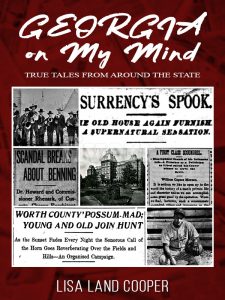
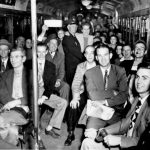
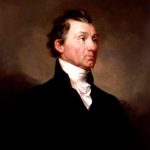
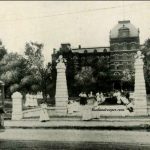
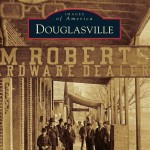
Leave a Reply